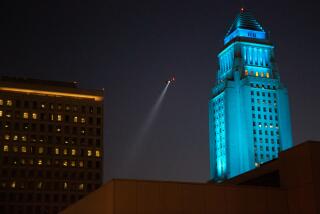Hughes Helicopter Faces Probe of Billings to Army
- Share via
WASHINGTON — Hughes Helicopter Inc., a part of the empire built by the late Howard R. Hughes that was sold to the nation’s largest defense contractor in 1984, has become the subject of an investigation involving “serious charges of accounting irregularities,” Army Secretary John O. Marsh Jr. disclosed Friday.
The company, which is currently holding roughly $4 billion in Army contracts, had its monthly payments for overhead expenses cut off completely earlier this month, Marsh said.
Marsh added he had “named Undersecretary James R. Ambrose to direct a thorough investigation into serious charges of accounting irregularities with Army contracts by Hughes Helicopter Inc.”
“Overhead payments to Hughes were suspended on May 17, 1985, following review of a Defense Contract Audit Agency report citing numerous accounting deficiencies, including charges for unallowable costs, charges for duplicate costs and inadequate internal controls involving millions of dollars.”
Hughes Helicopter, which operates a plant in Culver City, is a subsidiary of St. Louis-based McDonnell Douglas Corp., which last year became the nation’s largest defense contractor. McDonnell Douglas received contracts worth $7.7 billion in fiscal 1984.
Hughes Helicopter is the Army’s prime contractor for the AH-64 Apache helicopter.
Jerry Meyer, a spokesman for McDonnell Douglas in St. Louis, said the parent company is confident that the Army will find that the firm has corrected the “internal billing and control deficiencies” since it acquired Hughes Helicopter in 1984.
Meyer said McDonnell Douglas purchased the firm from the Hughes estate on Jan. 6, 1984, at which time “we became aware that there were problems and had been deficiencies with its accounting and internal control systems.”
“But upon becoming the owners, we applied to them our internal control standards, which we think are clearly time-proven ones. Those are now in place. So to the extent that there have been problems and deficiencies, we believe they are now corrected. We’re working with the appropriate government people to get this entire situation rectified.”
A top Army legal official said, however, that audits that touched off the probe uncovered problems both before and after the sale to McDonnell Douglas.
C. Richard Whiston, chief of legal services for the Army, also said the company is now being denied about $30 million a month under the suspension order on overhead payments. Whiston said the Army has withheld $3.5 million since May 17.
He added that the company is still receiving about $30 million a month for work being performed on the Apache and the 25-millimeter Bushmaster gun, which is used on the Army’s Bradley fighting vehicle.
Whiston declined to estimate how much money might be involved in questionable billings submitted by the firm. At a minimum, he said it involves $1.7 million for executive bonuses that Hughes Helicopter had been specifically told that it could not claim.
He acknowledged the total could be much higher, however. He explained that Hughes Helicopter had been unable to provide vouchers to support large amounts of its overhead claims; that “their own internal books did not jibe” on how much it was paying its employees; and that numerous “unallowable costs” had been discovered in areas involving advertising expenses, legal expenses, membership fees, travel expenses and bad debts.
Whiston, who met briefly with reporters, said Marsh had not made any determination as yet on whether the company should be prevented from bidding on new contracts or on steps taken to suspend top corporate officials from doing business with the government.
Hughes Helicopter has so far delivered 26 Apache helicopters. The Army hopes to buy 675 of the helicopters in what would be a $9-billion program.
Whiston said the payment suspension was prompted by random audits of billings submitted from 1979 through 1984. He said those audits discovered such things as a lack of vouchers to support 40% of company overhead billings in 1981 and 37% in 1983.
In 1983, there was a $61-million discrepancy within Hughes Helicopter’s own books on how much it was paying employees, Whiston said.
“That has led us to believe that there maybe something was amiss in the indirect expenses that were charged to the Army,” Whiston said.
Also in 1983, Hughes paid out $1.7 million in executive bonuses to keep key officers of the firm in their positions for the sale to McDonnell Douglas. Hughes apparently included the $1.7-million payment twice within its overhead claims--and it was paid once--despite the fact that the company had been told that the claims were unallowable, Whiston said.
More to Read
Inside the business of entertainment
The Wide Shot brings you news, analysis and insights on everything from streaming wars to production — and what it all means for the future.
You may occasionally receive promotional content from the Los Angeles Times.










